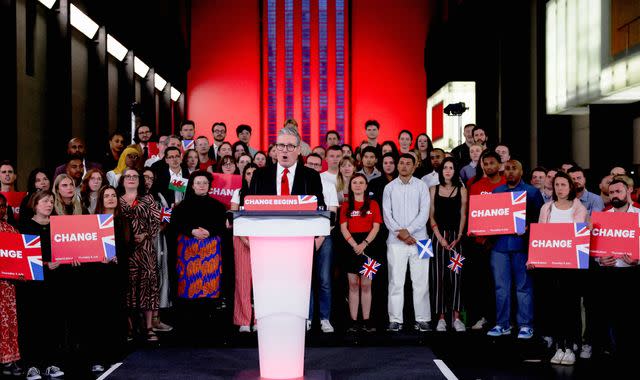What will Labour and Keir Starmer's first priorities be in government?

Labour has won the general election - with Sir Keir Starmer declaring: "Change begins now."
But once inside No 10, what will the new prime minister tackle first?
In Labour's manifesto last month, Sir Keir promised a government that will be both "pro-business and pro-worker".
There were no big policy surprises - but the document underlined key priorities previously set out by the party.
Follow general election results live
The economy
With the cost of living crisis a key issue for many voters, Labour say their first priority is to deliver economic stability.
The party's promising to follow strict fiscal rules the government already has in place - only borrowing to invest rather than using it on day-to-day spending.
They are also expected to raise £7bn in taxes, largely from a crackdown on nom-doms and tax avoidance.
Among the party's most eye-catching policies is ending the VAT tax break on private schools, in a move they say will raise an estimated £1.7bn that will be reinvested in the state sector.
Building 1.5 million new homes, ending no-fault evictions and a plan to build new towns is also in Labour's sights.
When asked what the public could expect in order for Labour to achieve their promise to "kickstart" the economy, shadow chancellor Rachel Reeves told Sky News after the exit poll: "We sought a mandate to grow the economy and that is what we are going to get started on doing.
"Reform of our planning system is clearly essential to build the housing we need, the transport infrastructure, the energy infrastructure."
Ms Reeves added that, as the first female chancellor, she wants to ensure the economy works for everyone - particularly women - who she said have "borne the brunt of austerity".
Immigration
Having condemned Rishi Sunak's Rwanda plan to deport people who arrive via Channel crossings to the African nation, Sir Keir is planning an alternative.
Labour have promised to launch a new Border Security Command to tackle the gangs behind the people smuggling, granting the organisation new powers under counter-terrorism rules to make an impact.
The new government plans to allow officers to conduct stop and searches at the border, carry out financial investigations and issue search and seizure warrants targeting organised immigration.
Crime
Similarly, tackling anti-social behaviour is another key focus for Labour, with Sir Keir having promised to recruit more neighbourhood police and bring in tough new penalties for offenders who cause issues in their area.
As the former chief prosecutor, the Labour leader previously said: "If you feel you can't walk down your own high street or be comfortable and safe in your own community, that is massive. That is a big inhibitor for so many people. It's not low level, it's really important."
Health
Labour also aim to cut NHS waiting lists by adding 40,000 extra appointments and operations every week - including more on evenings and weekends - and buying more equipment.
As the health service regularly comes out as the biggest issue for voters, Labour have pledged to get waiting times back down to a maximum of four months, as per the NHS target, by the end of their first term.
However, Sky News analysis has suggested an extra 40,000 appointments would make little change to the 7.57 million currently on the waiting list, according to data from April.
Energy
Great British Energy was one of Sir Keir's first standout policies that he announced at Labour's party conference back in 2022 - and one that has become more relevant as energy costs soared amid the war in Ukraine.
It is proposed that a new, publicly owned firm would provide additional capacity alongside the private sector to help establish the UK as a clean energy superpower.
Labour believe this would not only guarantee long-term energy security, but it would also cut bills and provide jobs.
Both Labour and the Conservatives back some form of windfall tax until 2029, want to decarbonise most or all electricity by 2030, and are vowing to ramp up solar and offshore wind.
Read more:
Key moments from election night
Meet Victoria, Sir Keir Starmer's wife
Education
Breaking down barriers to "opportunity at every stage" is another Labour pledge - an umbrella term that includes reforms for education.
The main policy is to recruit 6,500 teachers - with Sir Keir having said in the past that these new recruits will focus on key subjects "to prepare children for life, work and the future".
The party says these teachers will be paid for through Labour's plan to end tax breaks for private schools.


